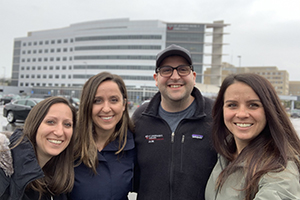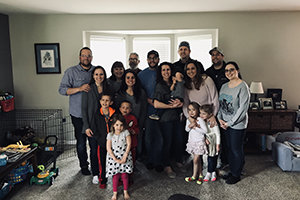By NANCY FOWLER
July 7, 2020
Growing up in southeastern Michigan, the six Vecore brothers and sisters shared everything from camping trips to backyard baseball games to their Catholic faith. As adults, the siblings continue to celebrate holidays and birthdays together, along with their parents and their combined six children.

Since mid-March, four of them have also shared something more serious: the possibility of exposure to COVID-19 on the job.
They all work in health care. Kim Kerr, 37, is a nurse at St. Mary Mercy Livonia Hospital in the Detroit suburbs. Melanie Hunter, 35, is an intensive care nurse at St. Joseph Mercy Oakland in Pontiac. Both are Trinity Health hospitals. Joe Vecore, 33, is doing clinical rotations in pursuit of a doctorate of nursing practice — nurse anesthesia at McLaren Bay Region Hospital in Bay City.
As a nurse anesthetist at Ascension Genesys Hospital in Grand Blanc Township, Lisa Vecore, 38, was initially less likely to work with COVID-19 patients.
"I was concerned for my siblings who were on the front lines," Lisa Vecore said.
In late March, she also joined the front lines after the cancellation of nonemergency surgeries shifted her duties to caring for patients in an ICU unit designated for patients with COVID-19. Especially given her own close family ties, it was heartbreaking for Lisa Vecore to witness the emotional pain of patients who could not have their loved ones near for comfort in life-and-death situations.
"We'd hold the phone up to the patient's ear," she said. "It was so hard watching families say goodbye over the phone or on FaceTime."
Lisa Vecore is back to being a nurse anesthetist now. But as the first wave of the pandemic drags on into summer, she continues to worry about her siblings.
"I feel nervous for them more than for myself," she said. "My sisters both have kids and my brother has a child."
'They understand how I feel'
None of the siblings expressed fear for themselves. But all are concerned about the same two family members: their parents, Jeffry and Cathy Vecore. At 65 and 63, they're at higher risk for severe complications from the coronavirus. Their adult children want to protect "G" and "Grandma Kitty" from any possible exposure to the contagion from themselves or even the grandchildren, so babysitting is out for now. This year's Mother's Day greetings were delivered by phone or from 6 feet away in the driveway of their childhood home. By Father's Day, the family felt safe enough to gather for an outdoor barbecue at their parents' home but stood 6 feet apart and talked to each other through masks.
Like her siblings, Kerr would love the chance to hug her parents and have up-close conversations. But the mother of three children, ages 5 to 9, knows she'll have to wait.
"I don't want to be that person who gives the coronavirus to our parents, and then spend the rest of my life thinking, 'What if I hadn't gone over there that day?'" Kerr said.

All six siblings keep up with each other through a group text they started long before the pandemic. They share pictures of their kids, one sister's new kitten and funny memes. Those in health care also swap stories about their jobs.
"We're all working in a similar situation," Kerr said. "They understand how I feel."
Daily routine
When COVID-19 first arrived in Michigan, many of their texts focused on the uncertainty of the emerging situation. The siblings wanted to know how many COVID-19 patients each other had. They asked whether the others had enough personal protective equipment and were curious about how they protected their families when they return from work.
But now, routines have set in. For example, to minimize the risk of contagion within her nuclear family, Hunter has grown accustomed to changing out of her scrubs into regular clothing at work, before coming home to her husband and two daughters, age 4 and 6.
"I think it's harder for people who haven't been affected by COVID-19," Hunter said. "They don't understand it as much, that people get really sick from it."
Joe Vecore, who returned to nursing for a month when his clinicals were interrupted by the pandemic, views the hospital as less risky than many other public places. At work, Joe Vecore said, he has all the personal protective equipment he needs. But the grocery store is a different story. He does the shopping for himself, his wife and their 3-year-old son, making sure to clean all the packaging with sanitizing wipes and throw away the bags. (Michigan issued a mandate in April requiring all residents to wear face masks in public settings, but there is no penalty for noncompliance.)
"At least in the hospital, you know which patients are positive," Joe Vecore said. "Out in the general public, you have no idea."
Like everyone, Joe Vecore looks forward to the day when COVID-19 is no longer a risk and he won't have to wear a mask at the grocery store or at work. But that day is not yet in sight. By early July, as the number of infections in the U.S. continued to rise at an alarming clip, a growing number of states were mandating the wearing of masks in public places.
"The N95 is really tight on your face, and you're kind of rebreathing what you're exhaling," he said. "Then, after you get out into the fresh air and take off your mask, you think, 'Gosh, this feels great.'"
Looking forward to family time
Lisa Vecore is also being careful at work and in public but has a philosophical take on her own risk.
"If I end up with COVID-19, I guess that's just what's supposed to happen," she said. "I can't be nervous about it while trying to take care of patients."
Lisa Vecore relies on her faith to get through hard times. She often turns to a book of short devotions a friend gave her. One particular daily passage that coincided with the day of her Catholic Health World interview brought her comfort.
"'I want you to know how safe and secure you are in my presence,'" Lisa Vecore read from the book, thinking of Jesus.
With an as yet indeterminant timeline for a prospective vaccine against COVID-19, Lisa Vecore pines for the relaxed and frequent family gatherings she once enjoyed.
"My siblings and I used to hang out on Friday or Saturday nights — more so than other siblings — and a lot of times, somebody has a bonfire," Lisa Vecore said. "I probably took that for granted because we did it so often. I just hope we can do it again."
Kerr also misses her sibling time and her children miss their cousins, aunts and uncles. But a silver lining of the pandemic has been that her immediate family of five has grown closer out of the necessity of isolating from others.
"We're cooking together, playing outside, taking walks," Kerr said. "Doing all those things we didn't do enough of, before."
